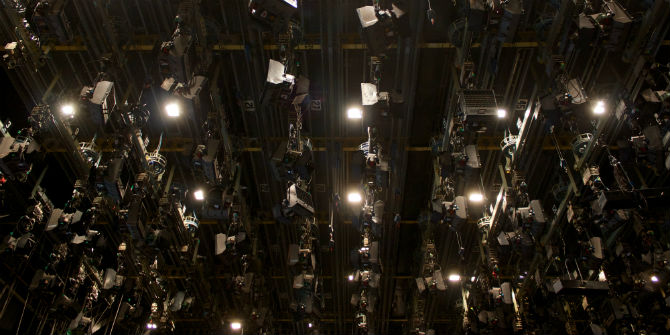 In the US, two election technology companies are suing right-wing broadcaster Fox News for defamation over the network’s coverage of the 2020 presidential election, when it broadcast stories about rigged voting machines. LSE’s Professor Bart Cammaerts looks at the implications of the cases for the relationship between capitalism, the media and disinformation.
In the US, two election technology companies are suing right-wing broadcaster Fox News for defamation over the network’s coverage of the 2020 presidential election, when it broadcast stories about rigged voting machines. LSE’s Professor Bart Cammaerts looks at the implications of the cases for the relationship between capitalism, the media and disinformation.
Capitalism tends to have all the cake, eat it and then ask even more of it. It generates persistently but in doing so it destroys even more often, and also has an innate propensity to neutralise and co-opt resistance against it. The spirit of capitalism, as explained by Luc Boltanski and Eve Chiapello, is contradictory, ambiguous and ‘not only legitimates the accumulation process; it also constrains it’; they even go further and argue that capitalism ‘can legitimate [accumulation] only because it constrains it’. While the discourse of capitalism is one of freedom, the reality is that the capitalist system puts all sort of limits on that freedom in order to survive and function.
A great example of this ambiguity, which is not getting a lot of attention as the media landscape is dominated by COVID-19, is a series of defamation and libel cases ongoing in the US. These have been brought against Fox News and other right-wing media organisations by companies that have incurred direct and demonstrable financial losses as a result of the peddling by these media of strategic lies and disinformation in the wake of Joe Biden’s win over the incumbent Donald Trump in the US election.
In late February, Smartmatic, a company specialising in electronic voting systems, filed a lawsuit in New York State’s Supreme Court for $2.7 billion in damages against Fox Corporation, which favoured Trump throughout his presidency and helped to disseminate his claims that the 2020 election was rigged. Smartmatic was falsely accused of being created by the late Hugo Chavez, a former socialist leader of Venezuela. The company claims that these and other persistent ‘false and misleading statements’ led not only to reputational but also financial damage, which constitutes a huge legal opportunity in the capitalist US system.
At the end of March, one of Smartmatic’s competitors, Dominion Voting System, also filed a defamation lawsuit against Fox News for $1.6 billion. The lawsuit claims that ‘Fox sold a false story of election fraud in order to serve its own commercial purposes, severely injuring Dominion in the process […] If this case does not rise to the level of defamation by a broadcaster, then nothing does’. The company also filed defamation suits against MyPillow CEO Mike Lindell (a Trump ally who appeared on networks including Fox News), and Trump lawyers Rudy Giuliani and Sidney Powell (who made claims about election fraud as guests on Fox programs).
Industry experts believe that Fox News is potentially in trouble here, and the right-wing media organisation is increasingly concerned about what this could mean if it is convicted and held accountable for spreading disinformation in the wake of Trump’s clear defeat. It is claiming First Amendment protection and stating that ‘the liability for defamation (if any) lies with the interviewee’, i.e. Giuliani and Powell. Last week, another right-wing channel, Newsmax, settled a case brought against them by Dominion’s head of product strategy and security, Eric Coomer, whom the broadcaster had accused of being an Antifa activist. But this involves an individual, and the question of lawsuits against media organisations is obviously more contentious and potentially more problematic.
Returning to my starting point regarding capitalism, it is not surprising that within a (neo-) liberal hegemony it can only be through capitalism and a capitalist logic that media organisations can be held accountable for strategically lying and peddling mis- and disinformation. From a liberal perspective, it cannot be the state putting limits on media organisations to stop them from doing so – media have, as philosopher Onora O’Neill pointed out some years ago, ‘a license to deceive’. Self-regulation is also clearly not working at all – indeed it rarely does, as the Leveson Inquiry amongst others exposed in the UK context. So, what is left are the so-called ‘self-correcting’ powers of capitalism, which extend to the legal system as this functions to a large extent to protect capitalist interests, as these defamation examples also demonstrate.
It would, in my view, be very ironic (and deserving) if Fox Corp and other right-wing broadcasters were forced – if only out of economic necessity and survival – into adopting higher editorial standards and doing more fact-checking as a result of having had to pay millions upon millions of dollars of damages to companies and individuals who incurred losses because of the broadcasters’ persistent and deliberate dissemination of blatant falsehoods. At the same time, the bar for proving defamation by a media organisation is rightly so much higher than by an individual, so it remains to be seen which capitalist interests the courts will privilege – those of the media businesses or of the voting tech companies – because indeed, capitalism always eats all of the cake and demands even more of it after it’s done.
This article represents the views of the author and not the position of the Media@LSE blog, nor of the London School of Economics and Political Science.
Featured image: Photo by Markus Winkler on Unsplash





